Electric System Boiler
Electric System Boiler – Electric Wet Heating Systems
What is an electric system boiler? – In contrast to a conventional electric boiler, which just contains a heat exchanger or chamber, a system boiler incorporates an expansion vessel as well as a circulating pump within the boiler. So, you have all the required components for a sealed wet heating system, also known as an unvented heating system.
Because of the way that an electric boiler system is constructed, there is no requirement for a feed and expansion system in the roof area or circulating pumps exterior to the electric boiler.
The fundamental difference between a system boiler and a regular boiler is how it is constructed.
Types of electric boilers
The earliest boilers ever developed for central heating systems were regular boilers, often known as traditional, conventional, or heat-only boilers.
Due to the low system pressure required by these older types of boilers, they are often supplied via a feed and expansion cistern in the attic, which is known as an open-vent heating system.
With a system boiler, installation is also quicker, simpler, and more efficient thanks to the built-in components, i.e., the heating expansion vessel and a pump.
The boiler’s compact design makes it excellent for heating applications when space is limited, as having the pump and expansion vessel within the boiler casing will eliminate unnecessary external plumbing that would be required if these items were separate components.
The last type of electric boilers are electric combi boilers, which do heating and domestic hot water on demand and these are detailed on this webpage – electric combi boilers
System boilers: electric
Electric system boilers for a wet central heating system are by far the most popular electric central heating boilers, just like they are for gas and oil boilers these days. As sealed heating systems offer many benefits to the customer.
No feed and expansion tanks that must be cleaned on a regular basis; no letting oxygen into the heating system water, which will promote corrosion. To prevent freezing, the pipes from the tank position to the boiler will need to be insulated when using an open vented central heating system.
A central heating electric boiler provides heat for a building
Electric boilers are an energy-efficient alternative to gas or oil boilers for home heating, as an electric central heating boiler has 100% energy efficiency for the immersion heater or heaters . A gas or oil boiler, even a condensing gas boiler, is 90–91% efficient at full condensation efficiency.
Electric boilers
Electric boilers work in a very similar way to gas and oil boilers in that they produce heat via immersion heaters, that is imparted into the hot water of the heating system, providing central heating via radiators or underfloor heating systems for small properties or larger homes.
Our Full Range of System Boilers
First, our touch-screen range of electric system boilers. This range of electric boilers has a fully touch-screen controller (like a mobile phone screen) and can also be controlled by a thermostat, programmer, or suitable “OpenTherm” compatible controller such as your Nest or Hive controllers, which allows you to control the system boiler via the controller or a mobile phone, so you can control your heating form anywhere in the world if you have Wi-Fi and an internet connection.
These electric system boilers have the lowest power steps on the UK and Irish markets; for example, the FHEL5, which has a maximum output of 4.5kW, has 500 watt or 0.5 kW power increments or steps, which means the boiler will modulate up and down from 0.5, 1, 1.5, 2, 2.5, 3, 3.5, 4, or 4.5kW, which ensures maximum efficiency by closely matching the central heating and domestic hot water requirements when using an indirect hot water cylinder.
Users can set the maximum output of the electric boiler to one of the power output levels, and the boiler will modulate up and down to that set level. E.g., the FHEL 5 can be set to 3.5 kw maximum output, and the boiler will ramp up and down to that kW output point.
The FHEL9 modulates up and down the power steps in 1 kW increments, thus 1, 2, 3, 4, 5, 6, 7, 8, or 9 kW outputs. The same applies as above, and this applies to all of this electric boiler range.
And finally, the FHEL14, which has a maximum output of 13.5 kW, modulates up and down the power steps in 1.5 kW increments, thus 1.5, 3, 4.5, 6, 7.5, 9, 10.5, 12, or 13.5 kW. The same applies to the boiler, which can be set to a particular desired output kW value and will ramp up and down to this value.
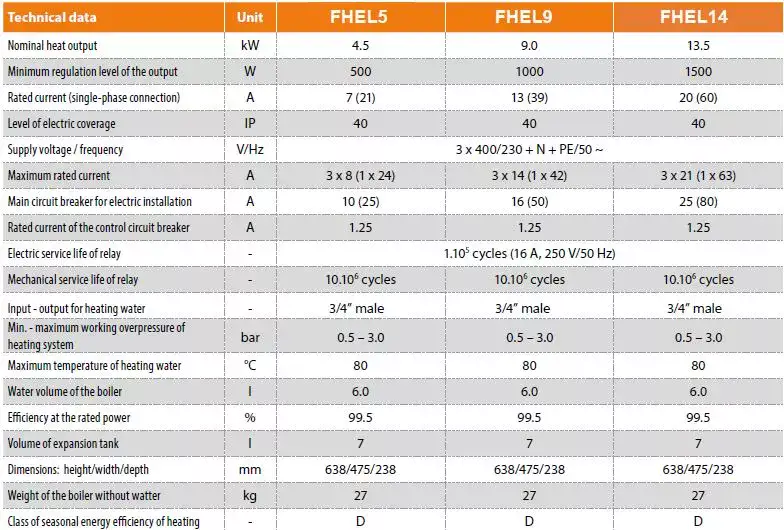
Touch series electric boilers for underfloor heating or radiators central heating – can be powered by either a single phase or three phase electrical supply.
Next is our standard series of electric system boilers:
These electric boilers still have a touch control panel, but it’s a partial one that’s still easy and intuitive to use.
Please note the following:
- After 15 kW, i.e., our 22.5 kW to 45 kW electric boilers, require an electrical three phase supply -3 Phase 400 volts, 50 Hz.
The 30 kW and larger size electric boilers—we physically don’t have the space within the boiler casing to fit an expansion vessel, but come with the pump integral to the boiler, so you have to fit an expansion vessel external to the boiler (by others) to complete the sealed system and make them system boilers.
The 7.5kW to 22.5kW electric system boilers modulate in 2.5kW power steps.
The FHEL8 has only 3 power steps on this unit, and the output can be set to either 2.5, 5 or 7.5 kW. Use the FHEL9; it’s a much better boiler.
The FHEL15 Electric Boiler’s outputs can be set to either 2.5, 5, 7.5, 10, 12.5, or 15 kW.
The FHEL23 Electric Boiler’s output can be set to either 2.5, 5, 7.5, 10, 12.5, 15, 17.5, 20, or 22.5 kW.
The 30kW and above jump in either 2.5kW or 5kW power steps.
FHEL30 – 30kw Electric Boiler: Output can be set to either 5,7.5,10,15,17.5,20,25,27.5 or 30kW.
FHEL38 – 38kw Electric Boiler: Output can be set to either 5, 10, 12, 5, 17.5, 22.5, 25, 30, 35, or 37.5 kW.
FHEL45 – 45kW Electric Boiler: Output can be set to either 5, 10, 15, 20, 25, 30, 35, 40, or 45 kW.
Download the Flexiheat Brochure For Electric System Boilers
Central heating with sustainable energy
When the electricity supplying your electric system boiler comes from renewable energy sources such as wind turbines, solar PV systems, or wave or water generated electricity systems, you are eliminating your carbon emissions, or at least reducing your carbon footprint, as well as reducing your running costs for your heating and hot water if you generate this electricity yourself.
Are electric boilers efficient compared to a gas boiler?
Yes, electric boilers achieve 100% efficiency by directly converting all the electricity that powers the heating element or elements into heating energy. Sometimes people refer to the overall efficiency as 99.9%, as the control panel of the boiler uses a minute amount of electricity.
A gas condensing boiler efficiency rate can reach up to 90–91% at full condensation (80% from fuel burning and 11% from flue gas condensation) when run at very low return temperatures.
Three phase electricity supply
When you have a three phase electric supply, you can install larger kW output electric boilers, as you have amps available in the electricity to power the electric boiler. We can go all the way up to 45 kW of heating element output.
Alternatives to gas boilers
Electric central heating boilers, especially electric system boilers, are a great replacement for traditional gas boilers, whether it be as a replacement or for a new installation. The benefits are:
No combustion takes place in an electric boiler; thus, no flue system is required with an electric boiler to flue the products of combustion that gas boilers installed produce.
A gas boiler has to be placed in certain locations, often to comply with flue system regulations—often on a wall that has external access so the flue can go straight out the wall—but with an electric boiler, you can locate them pretty much anywhere you want.
No gas supply means there is no chance of gas leaks.
There is no risk of carbon dioxide poisoning with an electric boiler installation.
Carbon emissions: gas boilers produce CO2 as well as NOx as they use fossil fuel.
If you use electricity to power your electric system boilers with renewable sources such as solar PV, wind turbines, or just purchase electricity that is produced by renewable sources, then you can reduce your carbon footprint or even have none at all for your central heating boiler.
Quiet operation: electric boilers are virtually silent, i.e., you can’t hear the heating element or elements heating the hot water in an electric water heating system.
Electric control panel: our electric boiler range has an inbuilt control panel that can be controlled by a thermostat or programmer. This can be an “OpenTherm” controller, such as a nest or hive type, allowing you to control these electric boilers from a phone, iPad, or computer as long as you have Wi-Fi or internet access.
What size of electric system boiler do you need?
We have a dedicated webpage on this which is here – what size electric boiler do I need ?
Who should consider an electric boiler?
Anyone who wants to have a wet central heating system but doesn’t have a gas supply or doesn’t want an oil tank at home. They are also a good alternative to a heat pump, in particular an air source heat pump in retrofit boiler replacement in wet central heating systems where the radiators, pipework, etc. were previously sized on the traditional flow and return temperatures of 82C/71C flow and return temperatures.
Most heat pump heating systems struggle to produce hot water over 55 °C, requiring the replacement of heat emitters, i.e., radiators, with units that can be up to four times larger and upsizing of pipework to accommodate the required flow rates for heating water. This issue also affects the demand for the domestic hot water tank demand, as domestic hot water needs to be stored at 60 °C to prevent legionella bacteria; thus, an immersion heating element or immersion heater is required to power the domestic hot water to this temperature.
Thus, in older properties, the additional cost of upgrading the wet heating system is prohibitive to many home owners, as the cost of materials and the cost of labour to fit all of the above will run into many thousands (even tens of thousands) of pounds.
This is where electric system boilers, when replacing a gas boiler for home heating and domestic hot water, are a suitable replacement with an easy install, as no heat emitters or pipework needs to be changed.
Electric system boilers for hot water and central heating
Electric system boilers can be installed anywhere in the house, are easy to operate, free from offensive fumes, do not need regular gas checks, do not require the installation of a flue, and have very few moving parts, minimizing the chances of malfunction. Get in contact with us for the best range of electric system boilers on the UK and Irish markets.

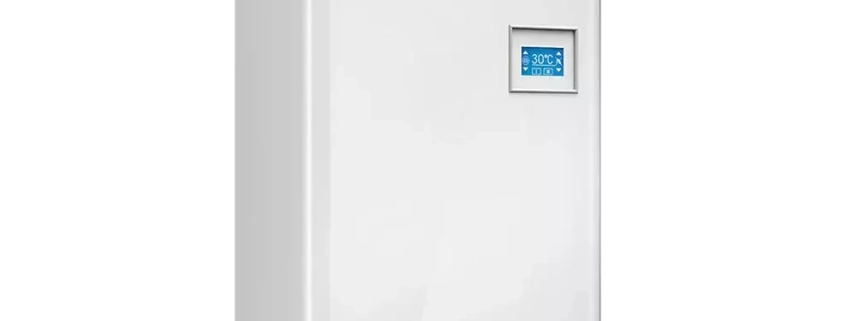 Flexiheat UK
Flexiheat UK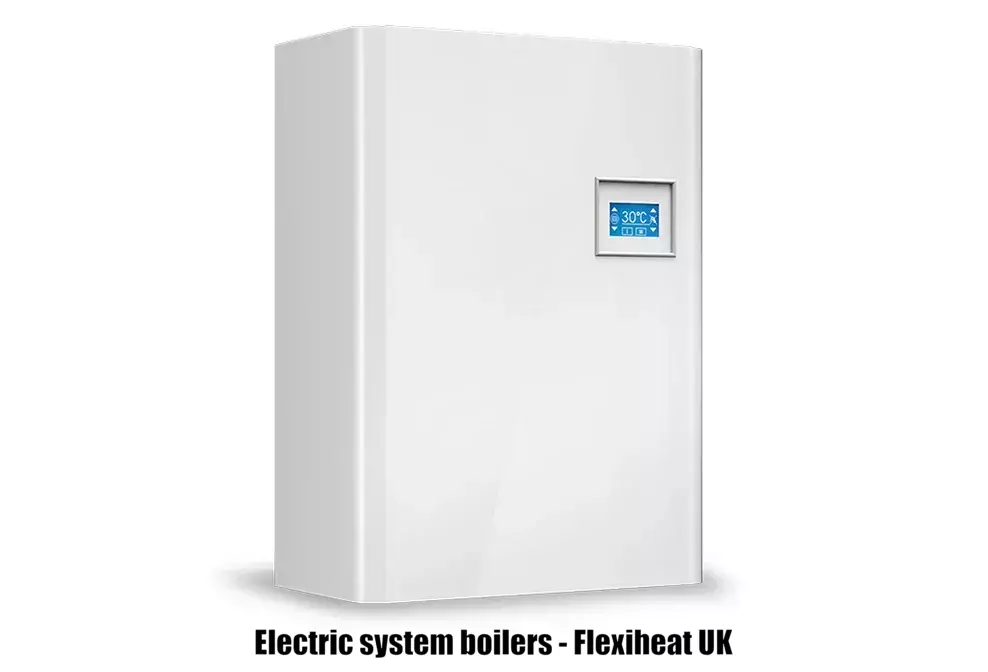
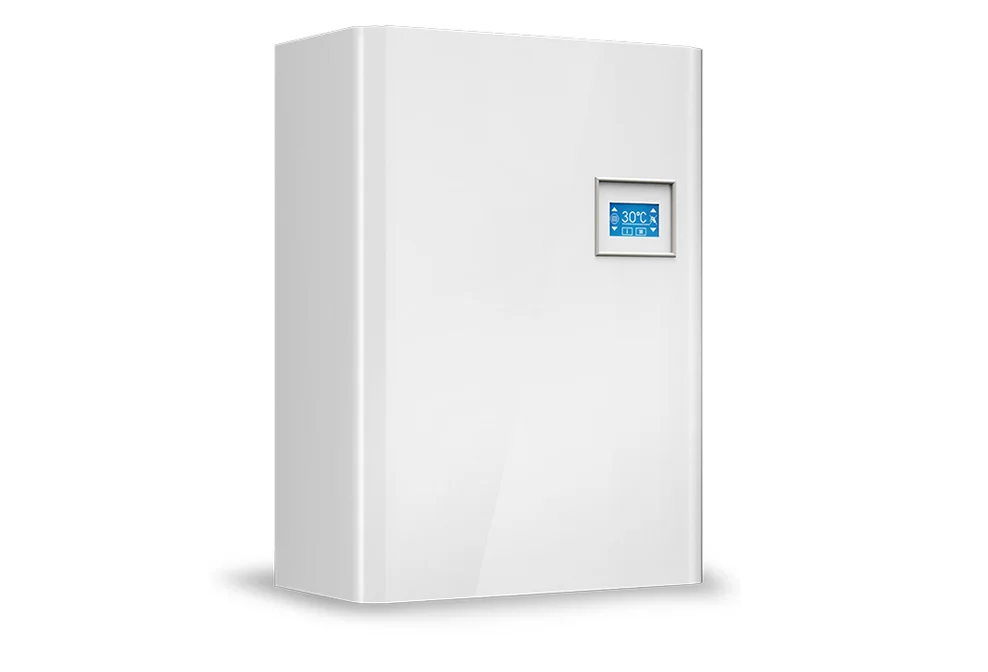
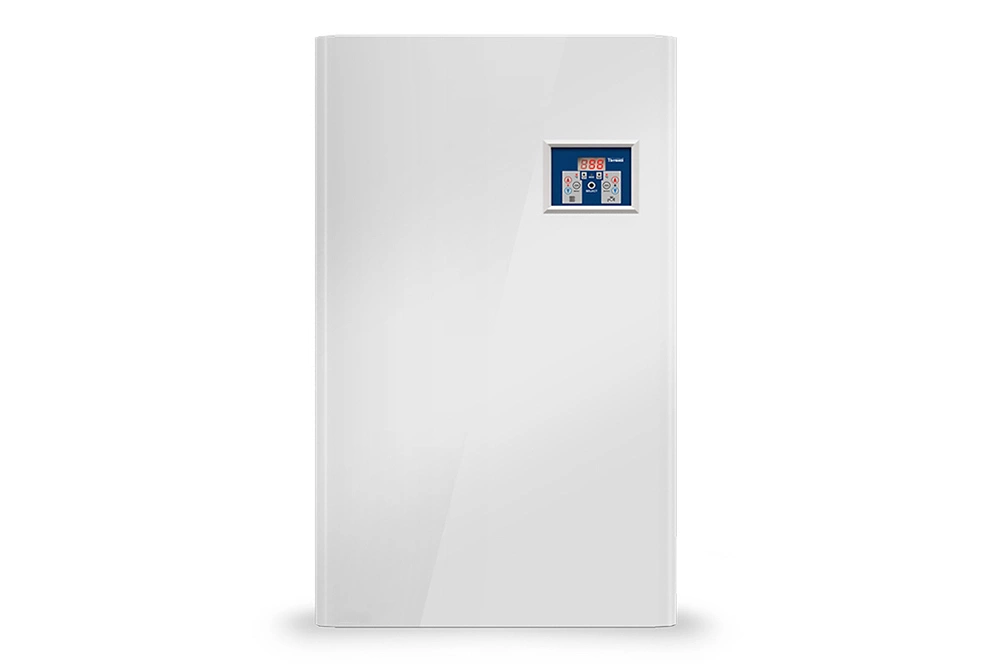
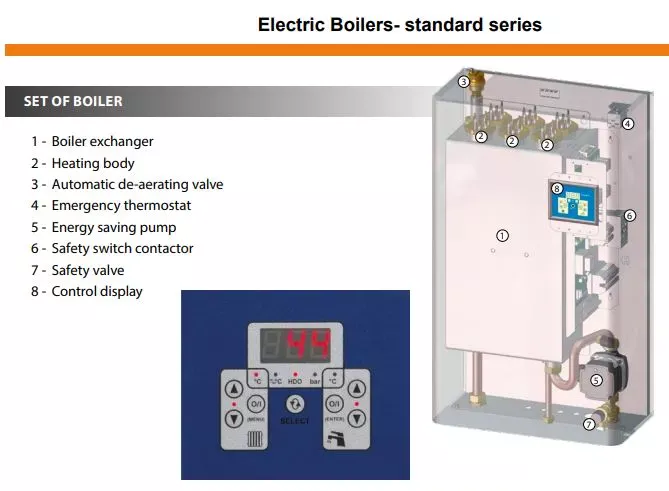
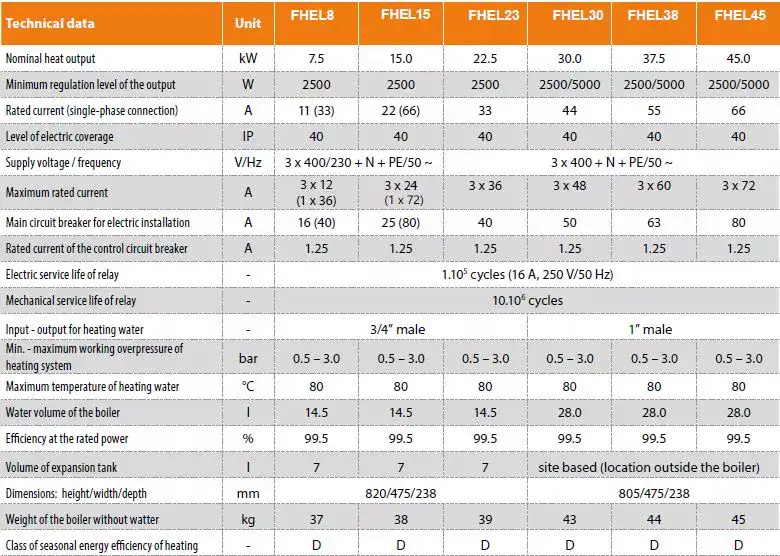
 Flexiheat UK
Flexiheat UK Flexiheat UK
Flexiheat UK